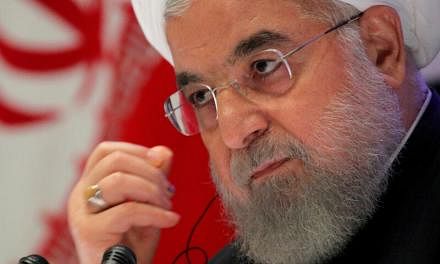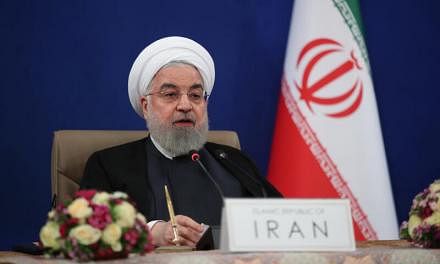Oil prices inched lower yesterday despite Washington's latest sanctions on Iran, which fuelled tensions in the Middle East that had earlier pushed the prices up.
Economists expect the latest move to have a muted effect on businesses and consumers here for now, barring a sustained period of elevated oil prices.
Benchmark Brent crude futures were down 42 cents at US$64.44 a barrel by about 6.20pm Singapore time yesterday, while US crude futures fell 32 cents to US$57.58 a barrel.
Last week, Brent climbed 5 per cent and US crude rose by 10 per cent after Iran shot down a United States drone last Thursday in the Gulf. This added to tensions already stoked by attacks on oil tankers in the area last month and this month, with the US blaming the tanker attacks on Iran, although it denies any role.
Iran used to be a major player in the oil market, exporting 2.5 million barrels per day (bpd) in April last year. The US reimposed sanctions on Iran's oil sales last November, and this month Iran has been exporting only 300,000 bpd, Reuters reported.
On Monday in the US, President Donald Trump ordered new sanctions against Iran's Supreme Leader Ali Khamenei and other officials, including eight Revolutionary Guard commanders.
"The escalation of US-Iran tensions has provided the backbone for a rebound in oil prices, but there are other factors at play," said OCBC economist Howie Lee.
"The prospect of a US rate cut as early as in July has sparked hopes of a turnaround in the global economy, while the softening US dollar has also played a role."
Two events will also likely shape the direction of oil prices in the short term, said Mr Lee.
They are the Group of 20 Summit this week, where President Trump and Chinese President Xi Jinping are set to meet, as well as the meeting of the Organisation of the Petroleum Exporting Countries and its allies, including Russia, early next week to decide on possible production cuts.
"An amicable outcome at the G-20 meeting - no further tariffs on China and amicable relations between the two presidents - would likely keep prices supported," said Mr Lee.
He expects geopolitical headlines to be the main driver for oil prices in the second half of the year, with a US-Iran armed conflict possibly pushing Brent back above US$70 a barrel, as the Strait of Hormuz bottleneck turns into an even narrower hotbed for passing oil vessels.
Noting that Singapore is a net importer of oil, UOB economist Barnabas Gan said higher oil prices will invariably lift consumer prices. He added: "Even though 95 per cent of all electricity in Singapore is produced by natural gas, higher oil prices have historically behaved in a positive correlation trend with other energy sources, including natural gas."
But Ms Selena Ling, head of treasury research and strategy at OCBC, noted that even as the impact on financial markets is usually immediate, businesses may only gradually factor changing oil prices into their cost equation unless they are intensive users of energy or electricity. "It would take a sustained period of elevated prices to filter through to actual utility charges," she said.
Maybank Kim Eng economist Chua Hak Bin said US-Iran tensions in the past have caused oil prices to rise more dramatically but now, an oil glut and weaker demand are weighing on prices.
When Arab oil producers imposed an embargo to boycott the US in 1973, the price of crude rose from US$3 per barrel to US$12 by 1974, he said, but noted that the advent of US shale oil today has increased the responsiveness of supply to higher oil prices.
Bilateral tensions have been mounting since Washington withdrew from a 2015 nuclear deal last year, adding pressure on Teheran with economic sanctions.












